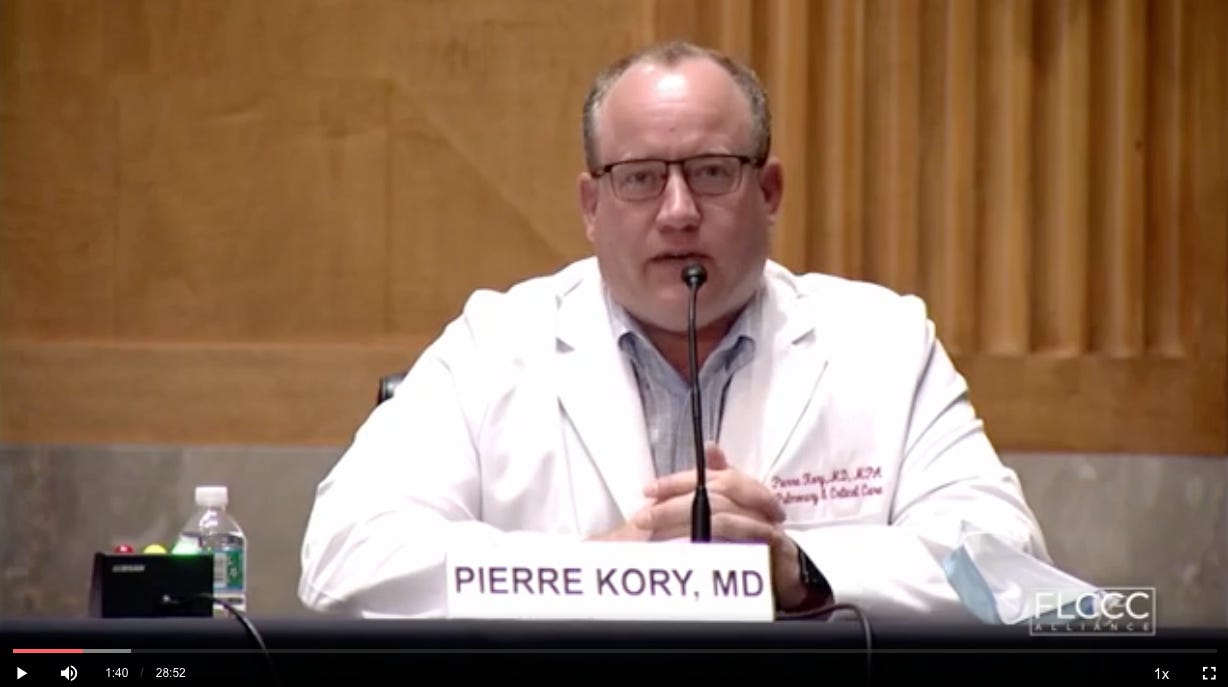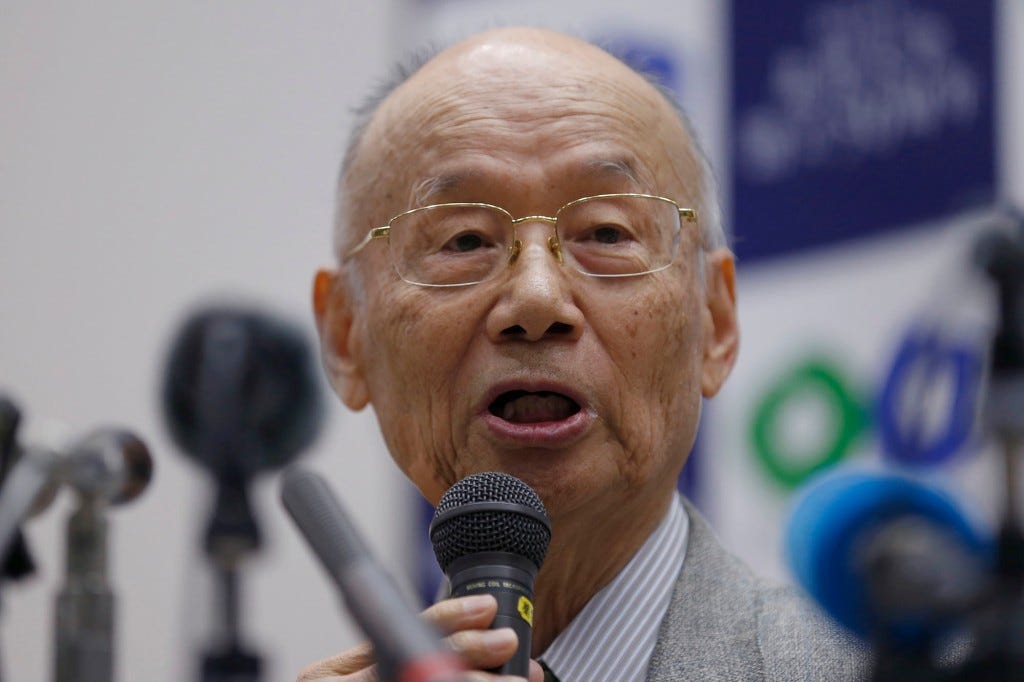Ivermectin and 'a very powerful lobby'. A summary.
April 2020 to March 2021 - sometimes it just needs laying out.
A summary of the key happenings with regards to Ivermectin, COVID and the ‘very powerful lobby’ between the second half of 2020 and March 2021. If you like the article please share it and consider becoming a paid subscriber. It’s part of a three-part series on Ivermectin, the links for which are below.
*****
In 2015, Satoshi Ōmura won the Nobel Prize for discovering Ivermectin. The drug had a massive impact in ridding the world of river blindness and elephantiasis. In humans.
Administered billions of times in multiple public health campaigns, Ivermectin became known as a ‘wonder drug’ with an ‘extremely good safety profile’. It is primarily used as an anti-parasitic but evidence suggests is effective across a very broad range of diseases.
Evidence showing Ivermectin had anti-viral properties emerged in 2012 at the University of Monash via the research of Kylie Wagstaff and colleagues.
Ivermectin’s patent expired in 1996 which means that pharmaceutical companies can’t make large profits when selling it. It is manufactured under license and costs as little as $2 for a course of treatment.
Enter COVID
April 2020. The same Monash team demonstrated that Ivermectin kills the Sars-COV-2 virus in vitro. The effect was demonstrated in the lab.
July 2020. There are now at least 36 studies registered looking to replicate these findings in humans. The research was taking place over the world from Italy, Egypt, Iraq and Argentina to Columbia, Mexico and Spain.
November 13 2020. Looking at results in 6,612 patients in 27 controlled studies, including 16 randomized control trials, Dr Pierre Kory and Dr Paul Marik’s systematic review of the evidence showed Ivermectin reduced hospitalisation and death in COVID patients. The pre-print would later be peer-reviewed and published in the American Journal of Therapeutics.
Below is a forest plot from the paper, the final diamond showing the overall effect on reducing mortality.
December 8 2020. Dr Piere Kory testifies in front of the US Senate that Ivermectin is saving lives. The video clip amassed 8,000,000 views before it was removed by YouTube. ‘They have decided there is only one medical viewpoint allowed, and it is the viewpoint dictated by government agencies,’ US Senator Ron Jonson. Blanket removal of information contradicting the World Health Organisation policy becomes social media policy.
December 27 2020. In a second independent systematic review, Dr Andrew Hill presents preliminary findings based on 11 randomized control trials involving 1,456 patients. It shows ‘an 83% reduction in the risk of dying for patients taking Ivermectin vs control, with confidence intervals of 65% to 92%’. Supported by Unitaid, which is hosted by the World Health Organisation, the research aims ‘to get to a WHO recommendation for the treatment being used worldwide.’
‘This really is going to be a transformational treatment,’ Dr Hill says.
January 3 2021. Dr Tess Lawrie, an expert in evidence-based medicine, presents a third systematic review of the evidence supporting Ivermectin. Finds ‘Ivermectin substantially reduces the risk of a person dying from COVID-19 by probably somewhere in the region of 65% to 92%." Below are the forest plots from Dr Lawrie’s rapid review. The bottom diamonds show the effect.
January 7 2021. 15,161 people die with COVID. Three systematic reviews of dozens of independent trials show Ivermectin is effective in reducing deaths in COVID patients. After no response from official correspondence to health authorities, Dr Lawrie posts a video appeal to Boris Johson. It is removed from YouTube.
January 8 2021. Dr Andrew Hill and Dr Tess Lawrie are now collaborating on a ‘Cochrane’ analysis of the Ivermectin data. Dr Lawrie is an expert in this area. They aim to clearly grade the strength of the data supporting Ivermectin’s efficacy for World Health Organisation regulators.
January 16 2021. ‘Fact-checking’ on Ivermectin has already started. In ‘debunking’ the claim that Ivermectin works, fact-checkers cite a study that concludes ‘Mortality was significantly lower in the ivermectin group.’ It is not clear how the study debunks Ivermectin, and that particular statement was never shared.
January 17 2021. Dr Andrew Hill is further advocating for Ivermectin as more studies arrive showing its ability to act as a preventative for COVID.
January 17 2021. Dr Andrew Hill jumps the gun. He publishes his findings on a pre-print server. The paper does not include a Cochrane Analysis. It does not grade the evidence. Under ‘International Ivermectin Project Team’ the paper includes the names of the authors Hill is reviewing. They should not be there.
The paper contradicts itself. When using Ivermectin in moderate or severe COVID cases, it says ‘…there was a 75% reduction in mortality..with favourable clinical recovery and reduced hospitalisation’.
But in the discussion section, the paper performs an about-turn: ‘Ivermectin should be validated in larger appropriately controlled randomized trials before the results are sufficient for review by regulatory authorities.’
The researcher seeking a global recommendation on Ivermectin had instead recommended against it. ‘I was shocked,’ said Dr Tess Lawrie. She immediately emailed Dr Andrew Hill, “Can you please retract it and we can do it properly?”
January 18 2021. Dr Piere Kory and Dr Paul Marick review the Hill paper and send an email. “We are highly disturbed that there may be scientific misconduct or fraud being committed by your superiors or some non-authors as we do not believe your true opinions and interpretations are what is written in the manuscript that you were the first author of.”
January 18 2021. 10,000 people die with COVID. Dr Andrew Hill and Dr Tess Lawrie have a zoom call. Dr Lawrie questions Dr Hill on the paper, she believes someone has influenced him to change the conclusions. The call is recorded.
Dr Tess Lawrie: "All right. So who helped to...? Whose conclusions are those on the review that you've done? Who is not listed as an author? Who's actually contributed?"
Dr Andrew Hill: "Well, I mean, I don't really want to get into, I mean, it ... Unitaid...."
Dr Tess Lawrie: "I think that... It needs to be clear. I would like to know who, who are these other voices that are in your paper that are not acknowledged. Does Unitaid have a say? Do they influence what you write?"
Dr Andrew Hill: "Unitaid has a say in the conclusions of the paper. Yeah."
Dr Tess Lawrie: "OK. So, who is it in Unitaid, then? Who is giving you opinions on your evidence?"
Dr Andrew Hill: "Well, it's just the people there. I don't...."
Dr Tess Lawrie: "So they have a say in your conclusions."
Dr Andrew Hill: "Yeah."
Dr Tess Lawrie: "Could you please give me a name of someone in Unitaid I could speak to so that I can share my evidence and hope to try and persuade them to understand it?"
Dr Andrew Hill: "Oh, I'll have a think about who to, to offer you with a name.... But I mean, this is very difficult because I'm, you know, I've, I've got this role where I'm supposed to produce this paper and we're in a very difficult, delicate balance...."
Dr Lawrie interjects: "Who are these people? Who are these people saying this?"
Dr Andrew Hill: "Yeah... it's a very strong lobby..."
Altering the conclusion of a paper would be a ‘substantial contribution.’ The person or persons responsible should be named as authors ‘to establish accountability and transparency surrounding the reported work’. No such people are named.
VERY IMPORTANT NOTE
Zoom notifies people they are being recorded. It is not possible to turn this feature off. Unitaid failed to respond to questions about this. Support required.
January 19 2021 A new version of the preprint turns up. ‘Preliminary’ is added, and the funding changes from ‘unrestricted research grant provided by Unitaid’ to just ‘Unitaid’. Sentences are inserted which further weaken the paper. The new version is called ‘v1_covered’. There are 93 other changes that will be detailed in new posts on The Digger.
January 21 2021. Following the rollout of Ivermectin across 25 states in Peru, deaths from COVID reduced by 74%. The graph below shows the Peruvian states using Ivermectin in blue, and the one control state (Lima) which rolled out Ivermectin four months later.
January 23 2021. Ivermectin is to be evaluated in a large ‘industry’ clinical trial across the UK. The news is welcomed by Andrew Hill. The trial goes would be referenced regularly by those questioning the quality of data on Ivermectin. By December 14 2021, the trial announces a ‘pause’ in the Ivermectin study citing ‘supply issues’. No data has thus far been produced.
January 24 2021. Andrew Hill is still positive about the research despite the ‘very powerful lobby’ which altered his paper. He tells Bons Sens it’s ‘just a matter of time before it gets approved.’ On Ivermectin’s efficacy against COVID, he says ‘we’ve got the evidence to prove it.’
February 3 2021. There are now 36 studies on Ivermectin. 18 of them are randomized control trials. All 36 studies demonstrate a positive effect on COVID outcomes. ‘The probability that an ineffective treatment generated results as positive for the 36 studies to date is estimated to be 1 in 69 billion’
February 4 2021. Merck, the original patent holder for Ivermectin, post a statement: ‘our analysis has identified no scientific basis for a potential therapeutic effect against COVID-19.’ They also cite a ‘concerning lack of safety data’ despite a near-perfect 30-year record. No data is shared to support these claims which directly contradict the existence of 46 positive studies.
At the time, Merck are trialling their own COVID therapy called ‘Molnupiravir’ predicted to cost hundreds of dollars per dose. To become authorised for use in the EU, Merck’s Molnupiravir must have its “relative effectiveness [compared] with existing medicines”. Regulators must also compare “cost-effectiveness” with existing medicine.
If approved for use, Ivermectin at $2 per treatment, would become a ‘comparator medicine’ against which new drugs would be compared. Despite this obvious conflict of interest, commentators triumphantly post Merck’s statement as definitive. The BBC and CNN amplify it further.
February 10 2021 ‘The Together Trial’ announces it too will investigate Ivermectin as a treatment at McMaster University in Canada. The large ‘industry’ study is partly funded by Bill Gates, who has “$250 million invested in dozens of companies working on Covid vaccines, therapeutics, diagnostics, and manufacturing” reports The Nation. “These investments put the foundation in a position to potentially financially gain from the pandemic.” A readily available $2 COVID treatment would reduce the value of Bill Gates’ pharmaceutical portfolio, thus creating a serious conflict of interest.
The Gates-funded Together Trial quietly stopped the Ivermectin trial citing ‘futility’ as the reason. No data has thus far been shared. A manuscript detailing this futility, in development for more than a year, has yet to materialise.

March 3 2021. The ‘horse blitz’ discrediting Ivermectin in the public sphere is now in full swing. ‘Ivermectin Is a Fake COVID Treatment that’s typically used on horses’ says Vice.
They quote a Professor of infectious disease from McMaster University. “An extremely high dose would be needed. The patient would likely experience dangerous side effects, such as gastrointestinal issues and neurotoxicity, or brain and nervous system damage.” Two weeks prior, McMaster University announced they were running Ivermectin trials, presumably without the intention to cause brain damage.
March 10 2021. Nobel Prize laureate Satoshi Ōmura makes a statement in the Japanese Journal of Antibiotics: “dozens of clinical trial results demonstrate that ivermectin is effective against COVID-19.”
He went on, “[we have] a meta-analysis based on 42 test results, it is estimated that the probability of this comprehensive judgment being a mistake is as low as 1 in 4 trillion”
Commenting on the Merck statement, he said, ‘Ivermectin competes with their development of MK-4482 (EIDD-2801) [Molnupiravir]. This may have been the reason it was eliminated.”
His detailed and data-supported statement is entirely ignored.
March 31 2021. World Health Organisation makes a recommendation not to use Ivermectin in patients with COVID ‘except in the context of a clinical trial’. The WHO Treatment Guidelines do not claim that Ivermectin does not work, only that certainty of the effect is ‘low’. They claim the studies show a risk of bias, but how such a determination was made is not explained. Despite a significant reduction in the number of studies, the WHO forest plot still shows a positive effect for Ivermectin.
On the day the World Health Organisation recommends against Ivermectin, there are 46 studies available, 24 of which are randomized control trials. 100% of the studies show positive effects.
How such a recommendation could be made given the overwhelming body of evidence supporting Ivermectin will be explored in Part 3 of the Ivermectin series available on The Digger. It will detail a connection back to Andrew Hill’s altered research paper, which is detailed in Part One of the series.
If you liked this article, please share it. It can only find the audience that you generate for it, as talking about Ivermectin is mostly impossible on social media channels, as detailed in this post. There are many, many more things to share about Ivermectin and the ‘very powerful lobby’ in future posts. This article only serves as a reference for the general timeline between 2020 and March 2021, many important details have been excluded and will instead be explored in new posts.























Great work Phil. Thanks for taking the time to connect the dots and lay all of this out.
Absolutely brilliant, well researched and immaculately documented.